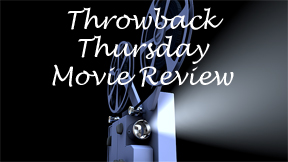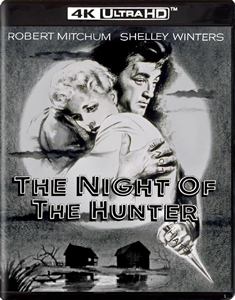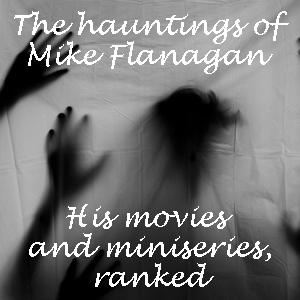Charles Laughton was a one-of-a-kind, larger-than-life actor – for better or worse. And his one film as a director, “The Night of the Hunter” (1955), is likewise weird and big – again, for better or worse. I didn’t get into the film on an emotional level, but it kept me mildly intrigued with its bizarre nature.
I’m still not sure if this mix of film noir and old-Hollywood grandeur is good or bad. But I can’t deny the well-documented influential moments:
- A corpse rests at the bottom of a lake, her hair flowing like seaweed, something we’d see in “The Haunting of Bly Manor.”
- The tattooed fingers of Robert Mitchum’s “pastor” Harry Powell spell out LOVE and HATE, an iconic image repurposed as brass knuckles in “Do the Right Thing.”
- A religious-themed murder scene is shot from a low angle, using the rare filmmaking tactic of showing the room’s ceiling. “Evil” Season 4 (as I learned in its bonus features) takes inspiration from this, shooting at “heavenly” angles to indicate the role of God.
- Powell chases two little kids up the cellar stares, hands outstretched like a monster. This image could smoothly be inserted into future slasher movies (although it should be noted that there’s no horror vibe whatsoever to this film).

“The Night of the Hunter” (1955)
Director: Charles Laughton
Writers: James Agee (screenplay), Davis Grubb (novel)
Stars: Robert Mitchum, Shelley Winters, Lillian Gish
“Night of the Hunter” is influential, but is it good? In an extreme minority opinion, I say not quite. Firstly, the movie is annoying at times, with Powell signing full religious songs and gaggles of kids singing a playground rhyme about the hangman. The film is as close as you can get to being a musical without being one.
Few of the characters are likeable, and those who are leave us uneasy. This might be a perk to some, but it unquestionably makes “Hunter” a cold experience. Powell – who marries the desperate, widowed and stupid Willa (Shelley Winters) in Depression-ravaged rural America — is unambiguously evil.
Depressingly few good people
But his counterpart “good guy,” Willa’s first husband Ben (Peter Graves), robbed a bank and killed two people! When he’s easily captured and sent to the gallows, he leaves a wife and two kids fatherless. Whatever Ben’s Robin Hood-esque intentions, his actions are atrocious.
Miss Cooper (Lillian Gish) takes in wandering orphans and – if we can say “Well, it was a different time” about her spankings – she is a positive adult role model. She contrasts with a woman the kids (Billy Chapin’s John and Sally Jane Bruce’s Pearl) meet earlier, who hands out one raw potato to each orphan and tells them to scram.
Some characters are interesting, but Laughton and writer James Agee (adapting Davis Grubb’s novel) don’t fully explore them. John is admirable in the way he keeps the secret of the money’s location from his evil stepfather. But in one key late scene, it seems there’s something off with him, like maybe his two father figures’ evil actions seeped into him. But no luck; I’m trying to will a subtext onto something simple.
The subplot of teenage orphan Ruby (Gloria Castillo) sneaking into town, desperate for the affection of any man who will tell her she’s pretty, could’ve been creepier. But her encounter with the fake pastor is mild, probably due to censor concerns – as are all the murders, which are off-screen. And I don’t mean to say the film creates a scary vibe nonetheless, like how “Texas Chain Saw Massacre” makes you think you saw a hook piercing flesh; it does not. There’s no sense of menace.
Mitchum’s performance is so over-the-top I wonder if he and Laughton are punking us, like “How ridiculous can we make this and have people accept it as artistic?” When Powell is shot, he runs into the barn wailing like a banshee. (And when ice-cream parlor lady Icey Spoon wails in bloodlust over the “pastor’s” evils, actress Evelyn Varden has clearly been instructed to dial it up to 11.)
Alternately smart and stupid villainy
I can see the metaphor about how humans are a type of animal, but Powell’s screaming comes darn close to being absurd. And, like many things about this movie, it doesn’t make sense. If Powell is badly wounded, why is that not evident when he emerges in the daylight, fully threatening again?
Although it’s evident that Powell is gaslighting the kids – treating them nicely, then horribly, then nicely again – in an attempt to get them to reveal the money’s location, it’s such a tedious approach. He’s pure evil, and impatient, so why does he not simply tell one sibling he’ll kill the other if they don’t spill the beans? He eventually does this, but it’s absurd how long he takes.
“Hunter’s” nonsensical vibe (How is Powell so smart with this scheme, yet also so dumb in pulling it off?) negates any fear we’d have for the kids. Logically, we know losing a father and a mother and being stuck with an evil stepfather during the Depression is horrifying. But the movie doesn’t let us feel it; it’s too stylized and disconnected from reality.
The weirdness is admirable in the abstract, but it never coalesces into a fascinating type of weirdness. The weirdness lacks texture; oddities are thrown at the wall. Some stick, but for me “Hunter” is a fascinating experiment, not a successful one.
My vote for the best one-movie wonder goes to Joel Anderson, for 2008’s “Lake Mungo.” But it seems the most popular choice is Laughton for “The Night of the Hunter,” which rates an 8.0 on IMDb. I wonder if he’s booming with laughter from his grave, knowing he pulled a fast one.


